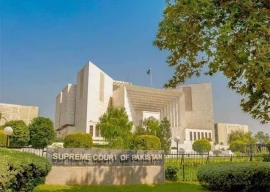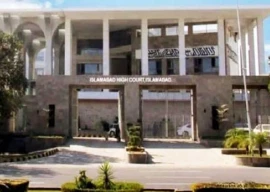
The state’s top law officer on Tuesday admitted that there might be a typographical error in the notification issued by the federal government in November last year with regard to the trial of former prime minister Imran Khan in the National Accountability Bureau (NAB) cases inside prison.
On Tuesday, a division bench of the Islamabad High Court (IHC), comprising IHC Chief Justice Aamer Farooq and Justice Tariq Mehmood Jahangiri, resumed hearing Imran’s petition against his prison trial. The trial relates to the Toshakhana and £190m references filed by NAB in December last year."
A division bench of the Islamabad High Court (IHC), comprising IHC chief Justice Aamer Farooq and Justice Tariq Mehmood Jahangiri, on Tuesday resumed hearing Imran’s petition against his prison trial in the Toshakhana and £190m references filed in December last year by NAB.
During the arguments, Imran’s lawyer Shoaib Shaheen said the procedure for the prison trial has not been followed.
He referred to the IHC’s order regarding Imran’s prison trial in the diplomatic cipher case, adding that the IHC had then noted that it is the trial court which must determine whether an accused’s trial should be held in prison or in a regular courtroom.
“The IHC had invalidated the trial court’s proceedings in the cipher case as the relevant trial court judge had not issued an order for Imran Khan’s prison trial,” he said.
Attorney General for Pakistan (AGP) Mansoor Awan, however, argued that the IHC’s order applied only to the trial court—a Special Court formed last year to hear cases filed under the Official Secrets Act, 1923— and not to the proceedings of accountability courts.
When the chief justice asked the AGP to explain how the prison trial in the current NAB cases differed from the prison trial in the cipher case, he said the Official Secret Act, 1923 does not have the 16-B provision available in the National Accountability Ordinance, 1999, the law that governs NAB and its cases.
Read: Toshakhana: lawyer picks holes in testimony
AGP Awan presented in the court the letter dated November 13, 2023 that NAB wrote to the Ministry of Law, requesting it to hold trial of the accused, who was already incarcerated at Adiala Jail, in prison. He also presented the summary moved in this regard to the federal cabinet and the cabinet’s decision.
In response to a query, the AGP said that NAB filed a reference against Imran on December 20. Imran’s lawyer Shoaib Shaheen clarified that one reference was filed on December 4, and the second one on December 20.
CJ Farooq asked the AGP how the government issued a notification for the prison trial of the accused before filing references. Shaheen noted that when the government issued a notification for Imran’s prison trial in NAB cases, the cases were in the inquiry stage.
“NAB could have dropped the charges after the inquiry instead of filing a reference. However, they permitted the prison trial of Imran even before filing the reference. One can understand what will be the outcome of such a trial,” he said.
The AGP, however, argued that the notification only determined where the federal government will hold the accountability court proceedings. “The mention of the word “trial” in the notification can be an error,” he said. The court later adjourned till today (Wednesday).
Meanwhile, the PTI founder, Imran Khan, has applied for post arrest bail in the Toshakhana and £190m corruption cases. The application asserts that the charges against the former PM are “politically motivated’ and “rooted in animosity”.
Imran in his petition, recalls the stance of former NAB chairman Aftab Sultan, who, he said, had refused to initiate politically motivated cases and had later handed in resignation.
























1716141490-0/image-(28)1716141490-0-270x192.webp)









COMMENTS
Comments are moderated and generally will be posted if they are on-topic and not abusive.
For more information, please see our Comments FAQ